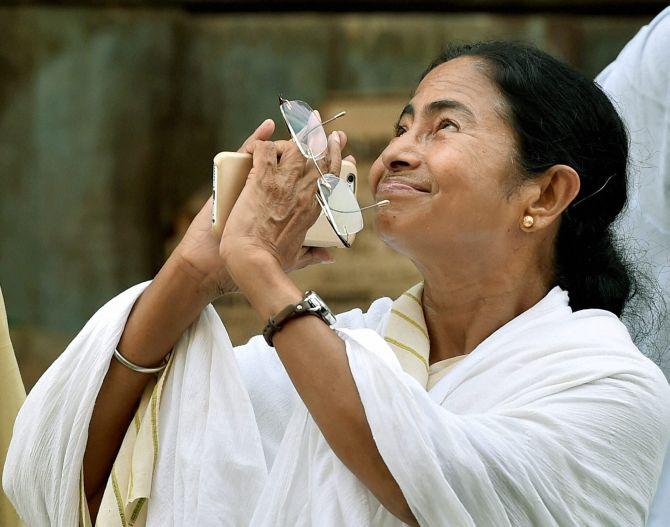This is possibly the last election in Bengal where two sides are squaring off against each other. Don’t expect the BJP to be a bystander five years hence, says Devanik Saha.

With four phases of polls over in West Bengal -- and two more to go -- the battle between the ruling Trinamool Congress and Left-Congress alliance has become fiercer.
In March, the announcement of six-phase polls in West Bengal drew Chief Minister Mamata Banerjee’s ire, who had accused the Election Commission of meting out step-motherly treatment to her state. Despite the long-drawn-out poll schedule, Bengal has been marred by excessive violence, voter intimidation, hurling of crude bombs, and killing of polling agents and workers.
Electoral analysts and journalists say the TMC is set to regain power, albeit with a reduced majority, owing to the party’s strong rural presence and it development work -- though not exemplary, sufficiently visible nevertheless -- will help the party sail through.
Whatever be the façade the TMC is hiding under is in reality a pack of cards waiting to crumble should the party lose the election. Massive infighting, dissidence due to ticket distribution, resurgence of the Communist Party of India-Marxist are some of the factors which have weakened the TMC internally.
Formed in 1998, apart from Banerjee and few other leaders, the TMC has primarily been a party of opportunists who didn’t get the desired favours from the Left dispensation and therefore switched ranks to the TMC.
Many of the TMC party workers and cadres actually worked for the CPI-M for several years. Lagging behind in industrialisation and privatisation, a government job is considered a dream, which leads to workers joining the ruling party in expectation of a government job for themselves or their family members.
Post the 2014 Lok Sabha polls, where the BJP had cornered a 17 per cent vote share, there was speculation that Krishendu Narayan Chowdhury, food processing minister and MLA from English Bazaar constituency, Malda, was eyeing a BJP entry until it became clear that the BJP wasn’t going to build on its impressive performance in the Lok Sabha elections.
Chowdhury, who first became an MLA in 2006 and 2011 on a Congress ticket, later shifted to the TMC in 2013, where he won the by-poll as well.
This time it is being speculated that Nihar Ghosh, an independent candidate unofficially supported by the Left, is poised to defeat Chowdhury and should he lose, would waste no time in joining the Congress or the BJP.
In the dangerously volatile Birbhum, TMC leader Anubrata Mondal, a feared man in the region, is being challenged by a former TMC member Sheikh Kajal, who is supporting the Left. Apart from Birbhum, Haringhata and Darjeeling have also witnessed severe infighting among the TMC ranks.
T o avoid disintegration, the only way out for the TMC is to win the polls and remain a magnet for those who run their illegal businesses and crime syndicates openly with the state’s support, and which serves to bind the party together.
For the CPI-M, it is an opportunity to resurrect itself in Indian politics amidst the massive rise of the BJP and the decline of the Congress in India. Down from 62 Lok Sabha seats in 2004 to around 10 seats currently, winning Bengal can augment its revival.
The CPI-M, a legacy-based party, is supported by people who strongly believe in communism and the party’s principles, unlike the TMC which attracts workers and politicians for the sake of making a quick buck through means fair and foul. Job promises and lure of quick money, however, can and have challenged the party’s survival.
After being ousted in 2011, many CPI-M workers shifted ranks, and it has now been compelled to form an alliance with the Congress (which is fighting it in Kerala) in its attempt to defeat the TMC.
Generally, it doesn’t take any big donations from corporates but is mainly run by contributions from members and well-wishers, whereas on the other hand the TMC has left no stone unturned to fill its coffers in the five years it has ruled the state, with Saradha scam being just one instance of the rot that has set in.
Land mafia, extortion businesses, bomb factories, real estate syndicates and cross-border illegal smuggling have all been having a free run under the TMC’s rule, with the party using its money and brute power to intimidate voters and crush the CPI-M support base.
If it fails to win this election, the CPI-M will find it extremely tough to keep its party supporters and workers together, and its hopes of a national revival will be dashed as well.
Finally, this is probably the last bipolar election in Bengal, thanks to the BJP playing truant. Post the Lok Sabha polls, it was in a strong position to make deep inroads into the state, until Mamata and Modi’s quid pro quo (slowdown of the Saradha scam investigation by the CBI for support in the Rajya Sabha) came into force.
But in the next election, due in 2021, it is highly unlikely the BJP would continue with its soft stand but will definitely fight it with its full might and strength.
Image: West Bengal Chief Minister Mamata Banerjee at an election rally in Kolkata. Photograph: Swapan Mahapatra/PTI Photo.










